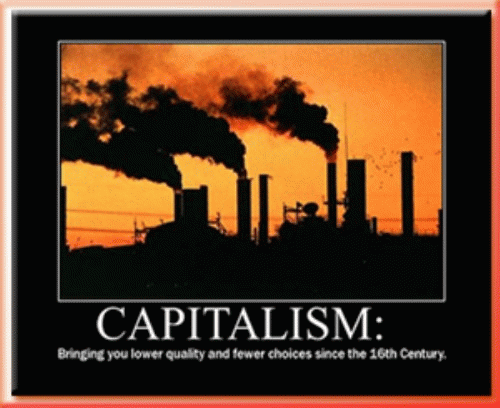
Economy v. Ecology |
|
Recently, Jeffrey Sachs, the well-known and well-respected liberal economist, visited my alma mater and delivered an interesting address. Sachs has been writing in Scientific American off and on for a while, bringing economics literally under that tent of science that Alfred Nobel and his heirs suspected economics might truly warrant. Well, economics is definitely a "social science." It is also a "hard science" in the sense that mathematics is used extensively. But economics, as Dr. Sachs suggested at the University of Virginia, must anchor itself to society. The past thirty-some years of anchoring it to its own hindquarters has proven to be an unmitigated disaster.
Free market fundamentalism is a term you have heard for months and years now. The basic hole in the theory (pardon the pun), posits that if left to itself, various forces within free markets will ensure that nothing will go awry, that the system is self-correcting, and that the hidden hand of a free market is, in fact, a humane avatar of the capitalists' consciences. Free markets are nothing of the sort!
There was not so much verbiage surrounding free market fundamentalism back in the Gilded Era of the post-Civil War period when the robber barons of big steel, the railroads, and the finance and banking industry did their thing, amassing fortunes and erecting their family empires—the Carnegies, Rockefellers, Vanderbilts, Morgans, Harrimans, Stanfords, and on and on. Back then, the paradigm was social Darwinism—survival of the fittest, and devil take the hindmost. It was an era of massive immigration, massive poverty, and massive exploitation of labor and misuse of the federal government (for the railroads would never have been as successful were it not for favorable legislation granting rights of way). It was red in tooth and claw.
Enter the opening decade of the 21st century and the tune is very similar, but with the extraneous verbiage of the free-market liberals, whose blinders to the role of government in making business prosper has been utterly irresponsible. Jeffry Sachs notes that free-markets in and of themselves cannot address the human issues that are intrinsic and paramount within an economy, which is after all a human creation. He says that relying on free-market forces is the near-complete surrender of political, moral, ethical, social and economic power to the forces of free-market capitalism.
We need a robust and value-based approach to the resource challenge. Instead, we have turned it over almost fully to the free-market economy alone in the past 30 years. That's the way resources have been allocated. Rather than ground the economy in a broad set of social institutions and a broad set of values, we let the market economy become unhinged. And it has become unhinged in a way that has now created a worldwide crisis.
It occurred to me while studying Sachs's speech that what has happened is that capitalists have adopted an "ecological" approach to or paradigm of economy! That is, they have developed a notion that like an ecology, economies are emergent and self-actualizing. Obviously, what they do not appreciate is that ecologies are inherently precarious balancing acts wherein the daily and seasonal activities of all the members and elements of the ecology are crucial to all other members. Among human beings (who by the way are notably rough on natural ecologies) governments are instituted so that one set of humans does not destroy the others inadvertently or deliberately. Human economies are not natural ecologies.
The first and perhaps most import of the three things that Sachs spoke about was that markets are inherently unstable. This is blasphemous, heretical, and revolutionary talk to a free-marketeer.
As much as we would like to think that markets are self-organizing institutions ... we've learned over the course of 200 years, and especially since the Great Depression, that there are inherent reasons why the kinds of financial crises that have hit our economy in the last couple of years are not profound aberrations, but are the kinds of shocks that can regularly hit a market system if the markets are not properly managed by regulatory processes.
For most of us, the ragged graphs and trend lines of professional market analysts and economist are proof enough. But periodic derailments and these headlong plummets into the abyss are the final straw. Homo sapiens of 2009 knows, to within an inch of its economic life, that markets are inherently unstable.
Second, Sachs argues that markets cannot ensure the "humane distribution of income." While the advent of global capitalism has, without question, brought perhaps hundreds of millions of people out of poverty, it has nevertheless left billions "struggling for survival every day" and "tens of thousands of people dying every day of poverty." In other words, the failures greatly outweigh the successes and, in almost any other field of inquiry, a theory as decrepit as this would be laughed out of town. Thirty years of unchecked free-market ideology, Sachs says, has left Americans with a life expectancy that ranks 36th in the world, a broken public education system and an underclass that is unique in the high-income world in the extent of poverty and hunger in our own midst.
Third, Sachs said, markets do not protect the physical environment. His approach to the crucial question of our times, global warming and environmental pollution, is to direct our attention to the results, rather than the causes. Sachs says that "market systems don't function properly in the commons." He alludes to a proper function of enterprise which is mostly absent from corporate behavior and shunted off into never-never land as "external" considerations, not the worry of the corporation. His acknowledgment of "the commons" as the world's "natural capital" is a profound restatement of the basic issue. Moreover, because markets lead people to think in terms of discounting future values into present values, Sachs said, "Markets actually direct us to use up resources, not to protect resources for the future."
Ultimately, what Sachs told us is that without ethics, morality and humane values, we are at the mercy of baser instincts, like hoarding and greed. The trick is to install ethics, morality, and humane values into our legislation and administration of the domestic and the international economies. Yes, of course, selfish and self-absorbed Boom generation capitalists will listen only to their own hungry inner voices, but, fortunately, we are nearly done with these people.
| Rate It | View Ratings |
James R. Brett, Ph.D. taught Russian History before (and during) a long stint as an academic administrator in faculty research administration. His academic interests are the modern period of Russian History since Peter the Great, Chinese (more...)
The views expressed herein are the sole responsibility of the author
and do not necessarily reflect those of this website or its editors.

OpEdNews depends upon can't survive without your help.
If you value this article and the work of OpEdNews, please either Donate or Purchase a premium membership.
STAY IN THE KNOW
If you've enjoyed this, sign up for our daily or weekly newsletter to get lots of great progressive content.
If you've enjoyed this, sign up for our daily or weekly newsletter to get lots of great progressive content.
To View Comments or Join the Conversation:




